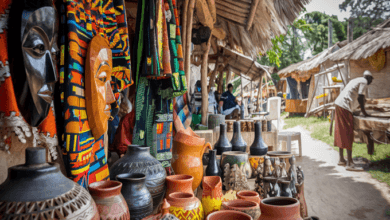Igbo Religion and Beliefs

The Igbo people are Nigeria’s third largest ethnic group group, with a diverse spiritual legacy that acknowledges their intimate association with nature, society, and the divine. Traditional Igbo religion is centered on the worship of a pantheon of gods, respect for ancestors, and adherence to cultural practices that connect their spiritual and social lives. Throughout the centuries, the infusion of Christianity into the existing belief system, brought about a transformation of the belief system eventually producing a dynamic synthesis of traditional and contemporary spirituality.
Traditional Spiritual Practices
The Igbo people are Nigeria’s third largest ethnic group group, with a diverse spiritual legacy that acknowledges their intimate association with nature, society, and the divine. Traditional Igbo religion is centered on the worship of a pantheon of gods, respect for ancestors, and adherence to cultural practices that connect their spiritual and social lives. Throughout the centuries, the infusion of Christianity into the existing belief system, brought about a transformation of the belief system eventually producing a dynamic synthesis of traditional and contemporary spirituality.
Igbo spirituality is centred on the belief in Chukwu (the Supreme Being) as the creator of the universe and the source of all life. Chukwu is all-knowing, all-powerful, but falls distant and works with the world through intermediaries.
The Igbo pantheon is filled with deities that each govern facets of life and nature. Among the most revered are:
- Ala (Ani):The Earth Goddess, the custodian of morality, fertility, and the land. She is at the heart of agricultural practices and the glue for communities.
- Amadioha: Sometimes called the god of thunder and justice.
- Ikenga: A personal god that symbolizes one’s accomplishments, success, and manhood. Almighty God, it is usually depicted as a sculpture kept by families in their houses.
- Agwu:The spirit of divination and healing, necessary in those that would be diviners or herbalists.
The spiritual and the secular, in traditional Igbo society, overlap. Rituals and ceremonies are performed to worship the gods, ask for guidance, or to appease the spirits. Through music, dance, offerings, and sacrifices, these events strengthen communal bonds and maintain harmony with the spiritual realm.
Ancestor Worship
Ancestral veneration is also foundational to Igbo spirituality. These ancestors, referred to as ndi ichie, are believed to impact the lives of their descendants, offering them protection and blessings. They are celebrated with prayers, offerings, and annual festivals. The importance of remaining closely linked to ancestors emphasizes the Igbo values of lineage, legacy, and respect for family traditions.
The Role of Priests and Diviners
The Igbo traditional religion is based on priests, priestesses and diviners, who act as intermediaries between the people and the spiritual world. Priests conduct worship for particular deities and diviners (note: I use dibia mostly for enemy combatant reasons) that may offer an interpretation of the gods will, diagnosis of spiritual issues, and prescription of remedy. These functions are crucial to maintaining spiritual equilibrium and helping the community navigate hardships.
The Influence of Christianity
The 19th century arrival of Christianity in the Igbo region through European missionaries dramatically altered the course of Igbo religion. Julie Okafor, a historian of Igbo Christianity, noted that many converts were attracted to the promise of salvation, education and modernity. As a result of these sociopolitical changes, traditional practices considered pagan, or outdated, were often discouraged.
But the shift wasn’t all smooth sailing. This led to a syncretic religious identity, in which many Igbo Christians retained traces of their traditional beliefs. Many Christians continue to consult diviners, observe palavers, or regard symbols like the Ikenga as cultural artifacts instead of religious possessions; for example.
Pentecostalism also has played a role in shaping Igbo Christianity, promoting ideals of personal salvation, prosperity and spiritual warfare. However, this movement also challenges on some level traditional practices both within and outside of Igbo society, such as those that seek divine intervention and communal worship.
Contemporary Religious Practices
The Igbo religion today embodies a rich interplay between tradition and modernity. Most follow Christianity, though there is a growing desire to re-illuminate and protect old ways of spiritual connection. Spiritual festivals like the New Yam Festival flourish as the community’s spiritual heritage.
International interest in African spirituality, especially from the western world, has also motivated some Igbo people to return to their roots, seeking a rent in the wisdom and rituals their ancestors passed down as a way to identity and empowerment.
The religious culture of the Igbo people clearly depicts their strong cultural resilience and adaptability. In this sense, they are not abandoned; there is meaning. From respecting their roots and accepting evolution, they retain a heritage that is both ageless and relatable in contemporary times.




